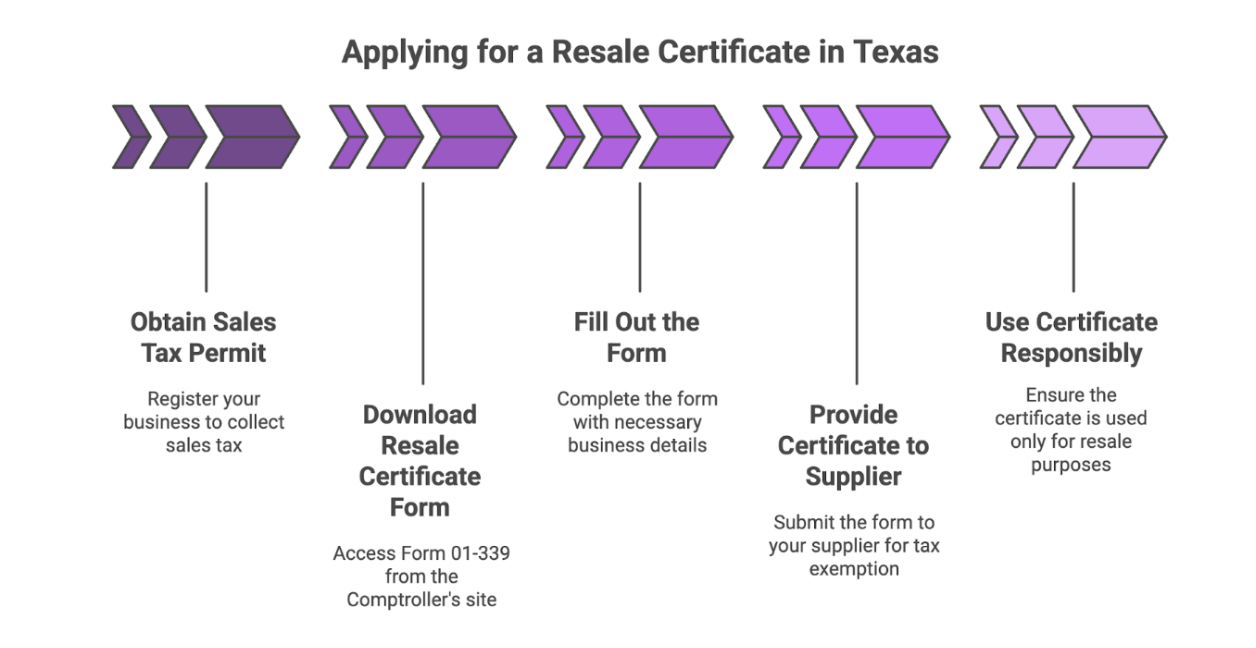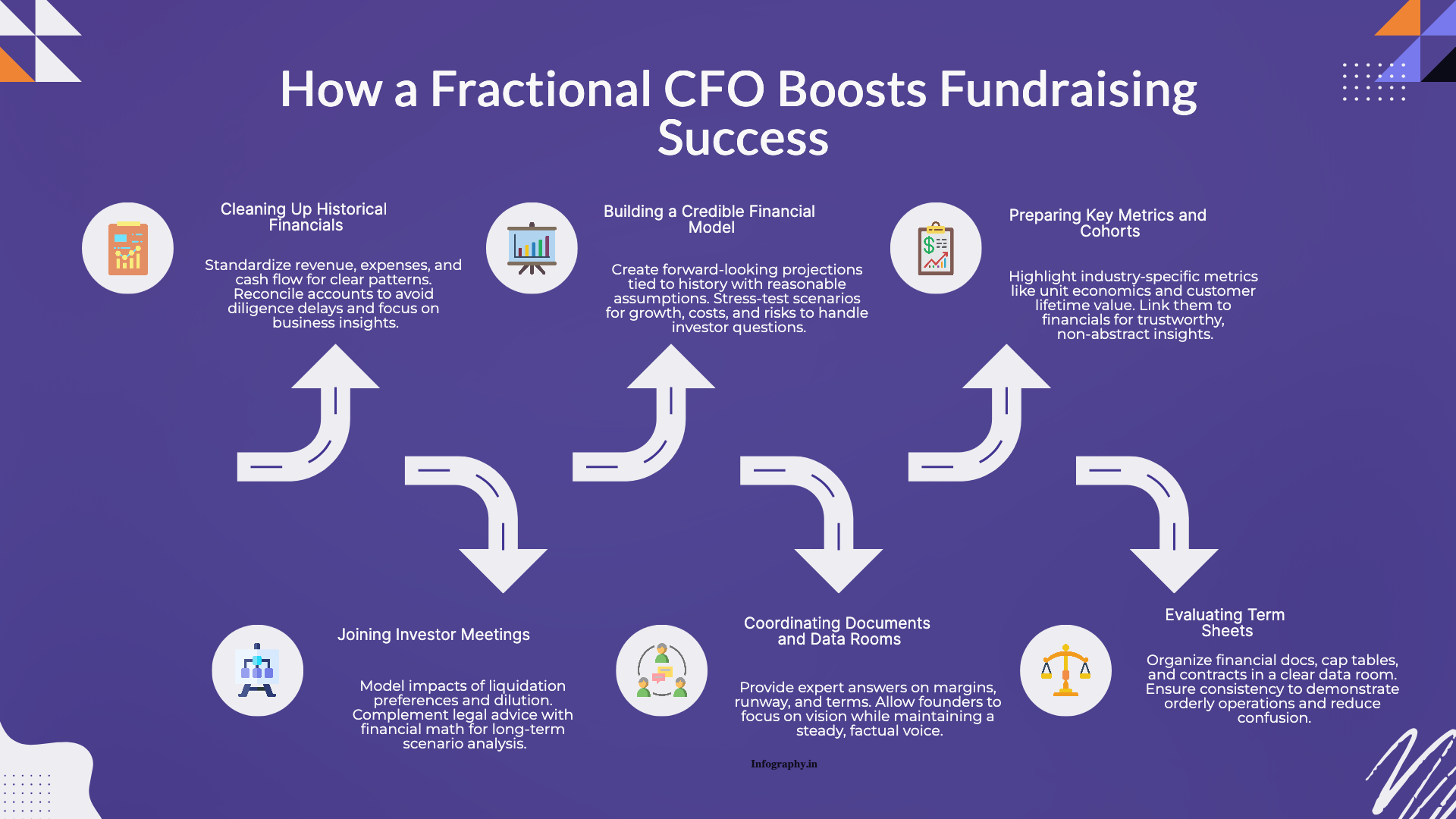If you're buying inventory to resell in Texas, whether you run a retail store, dropshipping business, or even a service that uses goods, there's one piece of paperwork you don't want to skip: the resale certificate.
It sounds like just another form, but here's the deal: without it, you're probably paying sales tax on purchases you shouldn't. That means tighter margins, unnecessary expenses, and potential issues if the state ever comes knocking.
A Texas resale certificate is a document that allows businesses to purchase goods tax-free if they intend to resell them. Simple in theory but like most compliance tools, the details matter. Use it wrong, and you could face audits or penalties.
Skip it entirely, and you're paying taxes twice.
This guide breaks down:
If you're trying to get this right the first time without digging through the state website, you're in the right place.
Let's get into it.
A Texas resale certificate is a legal form that lets your business to purchase goods or taxable services without paying sales tax, but only if you plan to resell those items or include them in a taxable transaction with your customer.
Instead of charging you tax at the time of sale, the seller accepts a properly completed certificate as proof that the sales tax will be collected later, when you resell the item.
It's not a loophole. It's how Texas ensures sales or use tax is only paid once, by the final customer.
Let's say you run an online clothing business in Texas. You buy blank T-shirts from a distributor to print and sell. If you provide your supplier with a resale certificate instead of paying sales tax, they don't charge you sales tax. Later, when you sell the printed shirts to your customer, you collect sales tax from them and send it to the state.
In short:
That's the resale certificate in action.
Under Texas Administrative Code §3.285, a resale certificate can be used when purchasing:
Common examples include:
The resale certificate is only valid when the item will not be used by your business , even temporarily.
A resale certificate is not:
To use a Texas resale certificate, you must already have a valid Texas Sales and Use Tax Permit, or a comparable permit from another state if you're based outside Texas.
You also can't use a resale certificate to buy office supplies or equipment for business use, even if they're related to your operations (like furniture, or software for internal use). Doing so is considered misuse and may trigger penalties.
To be accepted, a resale certificate must include:
The seller must receive this form at or before the time of sale, and keep it on file to prove why tax was not collected.
As per 34 Tex. Admin. Code §3.285(e), a seller is not liable for tax on a sale made under a valid resale certificate if the form is filled out properly and accepted in good faith.
No, Texas resale certificates do not have an automatic expiration date.
But they must remain accurate and up to date. If your business address, entity structure, or sales tax permit number changes, you must provide an updated certificate. Otherwise, the seller may reject it or risk audit exposure.
If you're buying goods for resale and not using a resale certificate, you're paying sales tax that you don't have to, and then collecting it again from your customer. That's double taxation. It eats into your margins and creates unnecessary complexity in your reporting.
If you do use a resale certificate improperly, like for personal or business use, it can be treated as tax fraud, with interest, penalties, or legal action.
That's why getting this right from the start isn't optional, it's essential for proper tax compliance.
Technically, no , you can legally buy goods for resale in Texas and pay sales tax at the time of purchase. But that means you'll also have to collect sales tax again when you resell those items to your customers.
So while a resale certificate isn't mandatory, it is the only way to avoid double taxation on the same item.
Most Texas businesses that deal in resold goods , especially retailers, wholesalers, eCommerce stores, and service providers , do need a resale certificate as standard practice. Without one, you're hurting your margins and risking confusion during audits.
In short: If you're buying anything with the intent to resell, and you want to avoid paying sales tax twice, yes, you need a resale certificate.

Good news: applying for a resale certificate in Texas is free, and the resale certificate process is fairly straightforward , if you know where to go and what to fill in.
Let's walk through it step by step.
Before you can issue a resale certificate in Texas, your business must first be registered to collect and remit Texas sales tax.
That means you need an active Texas Sales and Use Tax Permit, issued by the Texas Comptroller.
If you don't have one yet, you can apply online through the Texas eSystems portal. Processing usually takes 2–3 weeks.
Out-of-state sellers: You may still be able to use a resale certificate in Texas if you're registered for sales tax in another state and have nexus in Texas.
Texas does not issue a resale certificate directly. Instead, businesses complete and provide Form 01-339, also known as the Texas Sales and Use Tax Resale Certificate / Exemption Certificate.
You can get a resale certificate from the official Comptroller site:
This form is not submitted to the state. It's provided directly to your supplier when making a tax-exempt purchase.
Here's what you'll need to complete the form properly:
The Texas Comptroller requires that the resale certificate be properly completed, signed, and dated before the sale; otherwise, the seller is legally required to charge tax.
Give the completed Form 01-339 certificate to suppliers before or at the time of purchase. This lets them exempt the sale from sales tax and keep the certificate on file as proof.
You do not send the form to the Texas Comptroller; it's strictly between you and the seller.
Pro tip: Keep a copy for your own records in case of an audit later.
You can only use a resale certificate when the items you're buying will:
Using the certificate to avoid tax on purchases for personal or internal business use (like machinery and equipment used internally or office tools) is considered misuse and can result in fines or interest charges.
Used correctly, this certificate saves you money and protects your business from double taxation.
The use of resale certificates requires understanding both the legal obligations and the proper certificate management practices. When you purchase taxable items using a resale certificate, you're entering into a legal framework that governs how these transactions should be handled.
A resale certificate is used when businesses need to purchase goods tax-free for resale purposes. The property purchased must be intended for resale in the regular course of business or resold in the normal course of your business operations.
Valid uses include:
The use of the certificate is restricted to legitimate resale situations. You cannot use it for:
Understanding these rules and regulations helps ensure compliance and avoid potential penalties.
Businesses often wonder whether to use a blanket resale certificate for ongoing relationships with suppliers. A blanket certificate covers multiple transactions with the same vendor, provided the types of products being purchased remain consistent and are all intended for resale.
This approach can streamline certificate management for businesses that regularly purchase the same types of items from the same suppliers.
If you sell taxable goods or services in Texas and a buyer hands you a resale certificate, don't just file it away and move on. That document protects you from liability, but only if it's filled out properly and you accept resale certificates in good faith.
Here's how to handle it the right way.
In Texas, if you don't collect sales tax, you're expected to have a valid resale certificate on file to explain why.
If you accept a resale certificate that's:
…you could owe tax plus penalties and interest, even if your buyer said all the right things.
That's why this isn't just paperwork. It's legal protection.
Texas requires particular legal information on the resale certificate:
You can use Form 01-339, the standard resale certificate format from the Comptroller's site.
Don't wait until after the transaction. If the state audits you, they'll expect to see the resale certificate dated on or before the sale. Late paperwork won't protect you.
You're expected to accept the certificate in good faith. That means the seller accepts a properly completed certificate only when it looks reasonable.
Example: If a buyer claiming to sell office supplies tries to use a resale certificate to buy catering equipment, that's a red flag. If you accept it anyway, you're at risk.
Texas law requires you to keep the certificate in your records for a minimum of four years after the sale. If the buyer is a regular customer, you can accept a blanket certificate for ongoing purchases, but it still needs to be specific, complete, and up to date.
You can always verify a Texas tax permit number through the Comptroller's permit verification tool.
When in doubt? Collect the tax. It's safer than trying to defend a bad resale certificate in an audit.
As a seller, it's on you to collect valid resale certificates and make sure they match the nature of the transaction. If everything checks out, you're protected. If not, the tax bill could end up in your lap.
If your business operates outside Texas, you'll need to navigate the complexities of different state requirements. Each state has its own rules for resale certificates, and what's valid in Texas may not be acceptable in other jurisdictions.
Some businesses face unique challenges with resale certificates:
While resale certificates are the most common type of exemption certification, Texas recognizes other exemptions for specific situations:
Each has its own requirements and proper documentation.
Modern businesses often use technology to streamline their certificate management:
These tools can help ensure compliance while reducing administrative burden.
Resale certificates might seem like a small piece of paperwork, but in practice, they touch your margins, compliance risk, and how clean your business looks when it's time to report or raise.
Done right, they help you avoid double taxation, streamline vendor relationships, and stay fully compliant with Texas law. Done wrong, or ignored entirely, and you could be looking at penalties, interest, or a scramble during audit season.
That's why resale certificates shouldn't be treated in isolation. They're part of a broader system, one that includes sales tax tracking, documentation, accurate books, and proactive financial controls.
And that's exactly where Madras Accountancy fits in.
We support U.S.-based startups, small businesses, and accounting firms with:
All delivered by a secure, well-managed offshore team that integrates seamlessly into your workflow
If you're figuring out how resale certificates fit into your growing business, and want a system that's built to scale without breaking, we can help.
The paperwork matters. But the process behind it matters more.

November 30, 2025
The image of a CFO sitting down the hall in a corner office does not match how many growing companies work today. Fractional CFOs are part of that shift.

November 30, 2025
When you start talking to investors or lenders, the quality of your numbers suddenly matters a lot. A fractional CFO can be the difference between a rough pitch and a calm one.